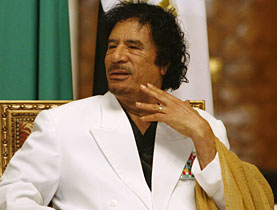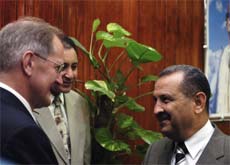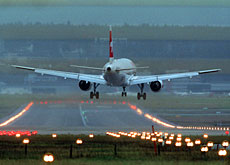Swiss attempt to defuse tension with Libya

Libya has been taking "worrying retaliatory measures" since last week's arrest in Geneva of one of Moammar Gaddafi's sons, says the Swiss foreign ministry.
The North African oil-exporting country has recalled some of its diplomats, suspended the issuing of visas for Swiss citizens, cut down flights to Switzerland and detained two Swiss nationals on various charges.
“Swiss companies in Libya have received orders to close and some company offices have been sealed,” Markus Börlin, head of the foreign ministry’s taskforce, said at a news briefing in Bern.
On Wednesday evening a Swiss diplomatic delegation arrived in Tripoli to give the Libyan authorities more details on the arrest and “to prevent a crisis between the two countries”, the foreign ministry said.
The moves against Swiss interests came a week after Hannibal Gaddafi, the Libyan leader’s youngest son, was arrested with his heavily pregnant wife Aline at a Geneva five-star hotel and spent two nights in a court cell.
The couple, who were released on bail and have left the country, were charged by a magistrate with inflicting physical injuries and using threats and force against two of their staff, who lodged a formal complaint.
The foreign ministry said that under the Swiss constitution the criminal proceedings against Gaddafi were the sole responsibility of the judicial authorities of the canton of Geneva.
No go
“The aim of the delegation is to secure the release of the two detained Swiss citizens and the lifting of sanctions against Swiss firms,” said foreign ministry spokesman Jean-Philippe Jeannerat.
“Switzerland has no reason today to talk about retaliatory measures against Libya. We are working towards solutions,” he added.
“This is not a crisis – it is an extraordinary situation.”
There are thought to be about 40 Swiss expatriates in Libya, most of whom have double citizenship.
On Wednesday Swiss International Air Lines confirmed Libya had restricted its flights to a single flight a week – on Sunday – following the arrest of Hannibal Gaddafi.
Airline spokesman Jean-Claude Donzel said the Libyan authorities had told them the reduction from three flights a week between Zurich and Tripoli was for technical operational reasons.
Swiss engineering concern ABB said one of its employees was among the two Swiss detained by the Libyan authorities since Saturday. It is unknown for whom the other captive Swiss works.
ABB and Swiss food multinational Nestlé said they had been forced to temporarily close their offices in Libya.
On Wednesday the foreign ministry advised Swiss citizens to cancel any travel plans to the country immediately, although since Libya only attracts a few hundred Swiss tourists a year, Swiss travel agents said they hadn’t been greatly affected.
“Own goal”
Foreign Minister Micheline Calmy-Rey spoke by telephone to her Libyan counterpart Abderrahman Shalgan on Tuesday. She protested strongly but also said that Switzerland wished to avoid any escalation and to maintain the good relations between the two countries.
Libya supplies around 50 per cent of Switzerland’s crude oil, and on Wednesday a group of hard-line Gaddafi followers who help to manage the Libyan leader’s political system threatened to turn off the tap if the Swiss did not apologise for the arrest of Hannibal Gaddafi.
The influential Revolutionary Committees Movement said they would push for “stopping oil supply to Switzerland, expelling Swiss companies working in Libya … withdrawing Libyan deposits in Swiss banks and stopping airline flights between Libya and Switzerland”.
Money from Libya in accounts at banks and trusts in Switzerland amounted to around SFr6.5 billion ($6.29 billion) in 2007, according to Swiss National Bank statistics.
But Rolf Hartl, managing director of the Swiss Oil Association, played down fears that the diplomatic spat could hit imports.
“The Libyans are heavily engaged in the Swiss oil market – they own the Tamoil refinery in Collombey, canton Valais, in addition to about 320 service stations in Switzerland. A Libyan embargo would be an own goal,” he told World Radio Switzerland.
Hartl was confident a Libyan oil boycott would not throw Switzerland into chaos.
“We have compulsory stocks which cover Swiss domestic demand for about two-and-a-half months for gasoline, diesel and heating oil and about three months for jet fuel,” he said.
“We would have ample time to adjust our supply scheme and to cover the loss of Libyan imports.”
swissinfo and agencies
Libya has a population of just under six million.
Libya is Switzerland’s second-largest trading partner in Africa (after South Africa) and in 2006 provided 49% of Swiss crude oil imports, according to the State Secretariat for Economic Affairs (Seco).
In 2007 imports from Libya, consisting almost exclusively of petroleum, dropped by 1.1% to SFr1.66 billion.
In 2007 exports, mainly in the machinery and pharmaceutical industries, rose by 16.3% to SFr278.6 million.
The first Swiss merchants settled in Libya at the end of the 19th century. Switzerland recognised the new state immediately after the Declaration of Independence in 1951. Around a dozen Swiss citizens were living in Libya at that time.
The oil companies brought more Swiss geologists, engineers and experts to the country and Swiss lawyers, such as Eduard Zellweger (1901-1975), acted as advisors to the government.
From 1962 the Swiss embassy in Tunisia represented national interests in Libya. In 1965 a consulate was opened in the Libyan capital Tripoli, followed by an embassy in 1968.
Today Libya is an important economic partner of Switzerland and its main supplier of crude oil. Political contacts between the two countries also returned to normal after the UN-imposed sanctions were lifted in 2003. Libya is one of Switzerland’s five key export markets on the African continent.

In compliance with the JTI standards
More: SWI swissinfo.ch certified by the Journalism Trust Initiative



You can find an overview of ongoing debates with our journalists here. Please join us!
If you want to start a conversation about a topic raised in this article or want to report factual errors, email us at english@swissinfo.ch.